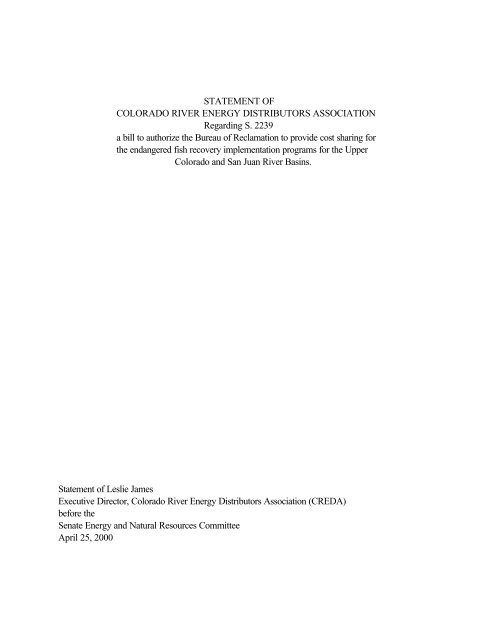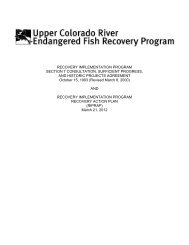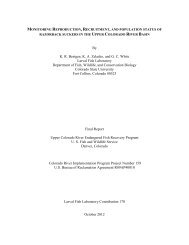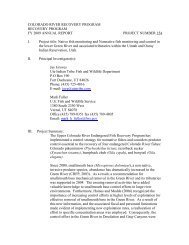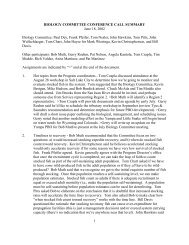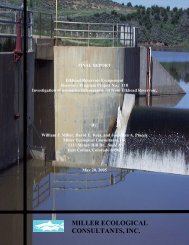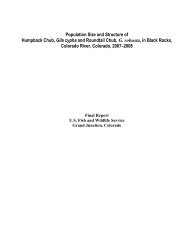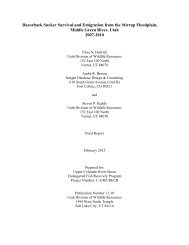Leslie James, Executive Director, Colorado River Energy ...
Leslie James, Executive Director, Colorado River Energy ...
Leslie James, Executive Director, Colorado River Energy ...
You also want an ePaper? Increase the reach of your titles
YUMPU automatically turns print PDFs into web optimized ePapers that Google loves.
STATEMENT OF<br />
COLORADO RIVER ENERGY DISTRIBUTORS ASSOCIATION<br />
Regarding S. 2239<br />
a bill to authorize the Bureau of Reclamation to provide cost sharing for<br />
the endangered fish recovery implementation programs for the Upper<br />
<strong>Colorado</strong> and San Juan <strong>River</strong> Basins.<br />
Statement of <strong>Leslie</strong> <strong>James</strong><br />
<strong>Executive</strong> <strong>Director</strong>, <strong>Colorado</strong> <strong>River</strong> <strong>Energy</strong> Distributors Association (CREDA)<br />
before the<br />
Senate <strong>Energy</strong> and Natural Resources Committee<br />
April 25, 2000
Mr. Chairman, members of the committee, I am <strong>Leslie</strong> <strong>James</strong>, <strong>Executive</strong> <strong>Director</strong> of the<br />
<strong>Colorado</strong> <strong>River</strong> <strong>Energy</strong> Distributors Association (CREDA). CREDA is a regional association whose<br />
members include more than 155 municipal and rural electric cooperative utilities in Arizona, <strong>Colorado</strong>,<br />
Nevada, New Mexico, Utah and Wyoming. CREDA members serve nearly three million electric<br />
consumers in these six states.<br />
CREDA’s member utilities purchase more than 85 percent of the power produced by<br />
the Glen Canyon and Flaming Gorge Dams and other features of the <strong>Colorado</strong> <strong>River</strong> Storage Project<br />
(CRSP). The CRSP, as many of you know, is a multi-purpose federal project that provides flood<br />
control; water storage for irrigation, municipal and industrial purposes; recreation and environmental<br />
mitigation, in addition to the generation of electricity.<br />
CREDA’s interest in the Endangered Fish Recovery Program and S. 2239 is specific<br />
and direct. As purchasers of the power generated at Flaming Gorge and Aspinall Unit, CREDA’s<br />
members pay over 95% of the costs of these water storage facilities. Changes in the operation of these<br />
facilities to provide for the recovery of the endangered fish have resulted in significant costs to the power<br />
users. In addition, 65% of the costs of the base program of monitoring and research over the past<br />
several years has been funded by power customers (currently $2 million per year). S.2239 provides<br />
that up to $6 million of the base annual funding including o&m of capital projects will be provided by<br />
power revenues. In addition, $17 million of reimbursable power revenues will be provided for capital<br />
projects.<br />
To date, over $20 million has been spent for capital projects to recover the endangered<br />
fish in the Upper Basin. Over the past few years, CREDA representatives have participated in<br />
discussions with representatives of the US Fish & Wildlife Service, the Bureau of Reclamation, Western<br />
Area Power Administration, representatives of the States of Utah, Wyoming, <strong>Colorado</strong> and New<br />
Mexico, and representatives of environmental organizations in an effort to develop authorizing legislation<br />
which would provide for cost sharing among the States, Federal agencies and CRSP power customers.<br />
CREDA member utilities are consumer-owned, not-for-profit utilities whose primary<br />
responsibility is to provide reliable, low-cost service to the consumers they serve. With this<br />
responsibility in mind, CREDA has worked with the funding participants to reach consensus on the bill<br />
as introduced. The bill contains language which provides funding certainty for the CRSP power<br />
customers. The language ensures that a) power revenues for capital projects will match State funding<br />
levels on a rolling two-year basis, and b) in the event the Cooperative Agreements which provide State
funding for ongoing operation and maintenance are terminated, the power revenue contributions<br />
terminate.<br />
CREDA’s support for the Recovery Program and this legislation is also based on the<br />
expectation that full and successful implementation of a defined program will make any further adverse<br />
changes in operation for endangered fish unnecessary.<br />
We appreciate the support of the Utah, <strong>Colorado</strong> and New Mexico congressional<br />
delegations for this legislation and look forward to working with them and the Committee to approve S.<br />
2239.
SUPPLEMENTAL INFORMATION<br />
<strong>Leslie</strong> <strong>James</strong>, <strong>Executive</strong> <strong>Director</strong><br />
<strong>Colorado</strong> <strong>River</strong> <strong>Energy</strong> Distributors Association (CREDA)<br />
1600 W. Broadway Road, Suite 111<br />
Tempe, Arizona 85282<br />
(480) 557-0987<br />
fax: (480) 557-0988<br />
email: HYPERLINK mailto:creda@uswest.net creda@uswest.net<br />
TOPICAL OUTLINE<br />
I. CREDA is a regional association representing over 155 municipal and rural electric cooperative<br />
consumer-owned utilities in Arizona, <strong>Colorado</strong>, Nevada, New Mexico, Utah and Wyoming; CREDA<br />
members serve nearly 3 million electric consumers.<br />
II. CREDA members purchase more than 85% of the power produced by the <strong>Colorado</strong> <strong>River</strong> Storage<br />
Project (CRSP), and fund more than 95% of the water storage costs. S. 2239 provides that 100% of<br />
the base annual funding be provided by power revenues (up to $6 million per year). In addition, $17<br />
million of reimbursable power revenues will be used to fund capital projects.<br />
III. CREDA’s support of this program assumes full and successful implementation of a defined program<br />
which will not make any further adverse changes in operation for endangered fish.<br />
IV. CREDA has worked with the funding participants in the Upper Basin Endangered Fish Recovery<br />
Program to develop language which will ensure (i) power revenues for capital projects will match State<br />
funding levels on a rolling two-year basis, and (ii) in the event the Cooperative Agreement which<br />
provide State funding for ongoing operation and maintenance are terminated, the power revenue<br />
contributions terminate. CREDA supports S. 2239 as introduced.<br />
RIPSenatetestimony.042500


